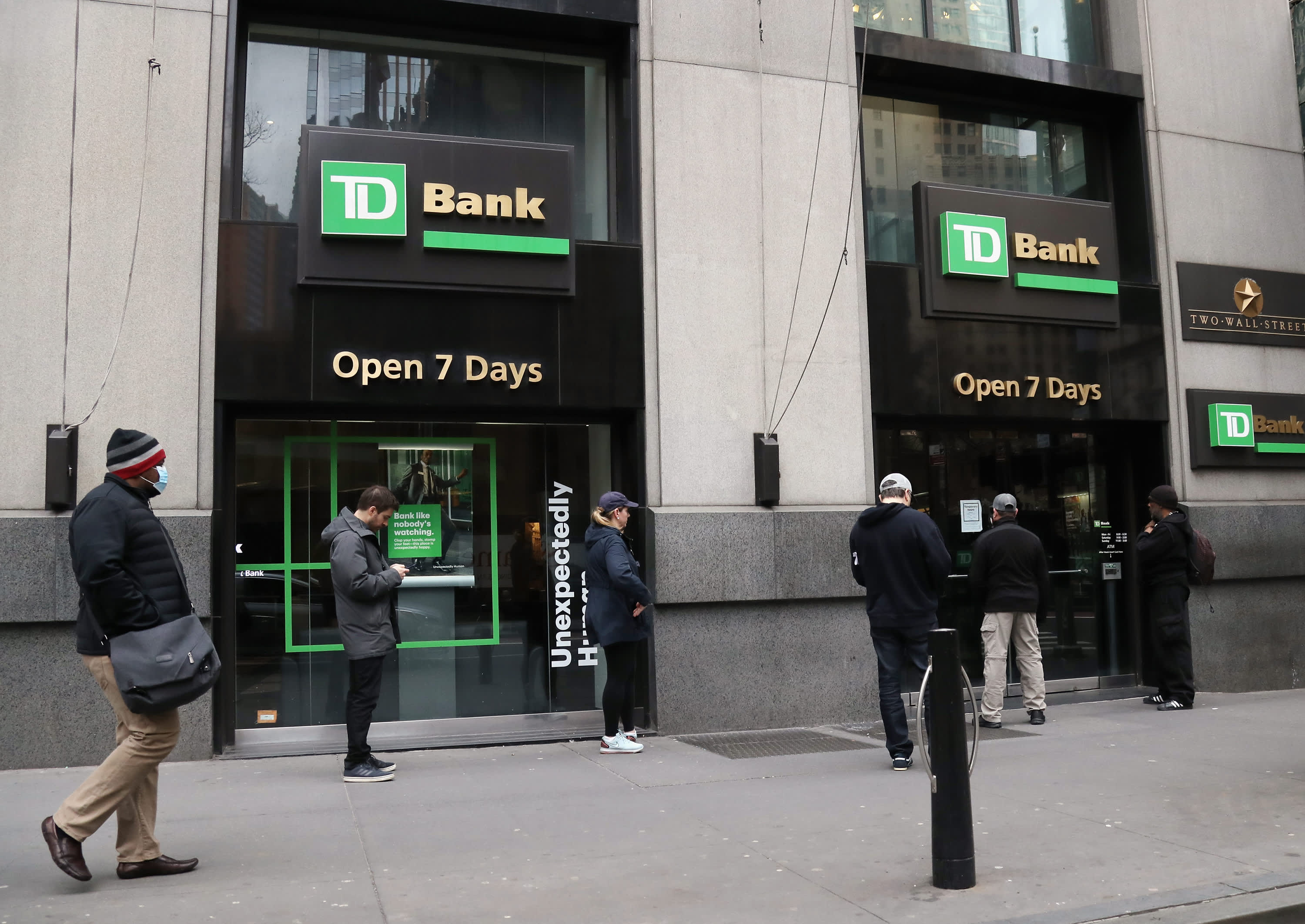
TD Bank on Thursday agreed to pay $97 million in restitution to approximately 1.42 million customers, as well as a $25 million civil penalty to settle allegations brought by the Consumer Financial Protection Bureau that it engaged in illegal overdraft fee practices.
Banks typically charge overdraft fees when you overdraw your checking account. Instead of having your debit card declined or the purchase canceled, your bank will cover the difference and charge you an overdraft fee. TD Bank, for example, charges $35 when you overdraft your account by more than $5 and levies up to five of these charges per day.
But under current laws and regulations, banks have to give customers the option of opting into overdraft programs before charging them these fees. According to the consent order entered Thursday, TD Bank didn't do that. Instead, the CFPB claims that from January 2014 through December 2018, TD charged consumers overdraft fees for ATM and debit card transactions without first getting their approval to enroll them into the program. In some instances, the CFPB claims TD Bank had new customers sign up for its Debit Card Advance overdraft program with the "enrolled" option pre-checked and did not mention the service at all.
Additionally, TD Bank allegedly used deceptive language when marketing its Debit Card Advance program, claiming it was a "free" service, as well as referring to it as a "feature" or "package" that "comes with" new checking accounts, according to the CFPB. But like all overdraft programs, TD's Debit Card Advance is an optional service.
Although TD Bank agreed to settle the case, president and CEO Greg Braca said in a statement Thursday that the bank disagreed with the CFPB's conclusions. "Throughout the period in question, TD had a clear process to secure formal consent before providing this service to customers, enabling them to make an informed and conscious choice," Braca said. He added that TD has already "voluntarily and proactively implemented enhancements" to the Debit Card Advance program's disclosure and enrollment processes beginning in 2014.
How to avoid getting dinged with overdraft fees
Americans spend about $117 a year on overdraft fees, according to a recent analysis by bill pay service doxo. Among households that overdraft once or more a year, the average cost is $354 per year.
Some consumers may not be able to avoid late fees or overdrafts, especially during the pandemic when millions are unemployed. But for many, these fees may be avoidable. In fact, many times they occur because people simply forget, says Jim Kreyenhagen, VP of marketing and consumer services at doxo. "We get busy, we don't think about moving money from our savings account to our checking account, we haven't set up an automatic transfer, so we overdraft."
Several banks, including Ally, Bank of America, PNC, Santander and Wells Fargo, have introduced programs that waive or refund overdraft fees upon request during the pandemic. Keep in mind that a majority of banks offering assistance right now do require that customers call to enroll in these programs; it's not automatic.
To further help those struggling amid the pandemic avoid these fees, Senators Cory Booker (D-N.J.) and Sherrod Brown (D-Ohio) introduced a bill earlier this year that would bar banks, credit unions and other financial institutions from charging overdraft fees until the coronavirus crisis is over. The bill, however, has not yet made it into a stimulus package or onto the Senate floor for a vote and currently only has a 4% chance of being enacted into law.
It can also help to make it a habit to regularly check your account balance to see if you have enough money there to cover your expenses. If you're short on cash at the moment, see if there's a way to avoid overdrawing your account, perhaps by dipping into savings or asking friends and family for financial support.
If you do find that you're routinely overdrafting, you can opt out of the overdraft protection program and avoid the fees altogether. There may be an option to unenroll from overdraft protection within your account settings on your online banking portal, or you may have to call your bank directly and ask to be removed from any overdraft programs. Once you're unenrolled, your debit card purchase will be declined if there's not enough money in your account.
Keep in mind that you can only opt out of overdrafts on one-time transactions made with your debit card, so if you use checks, or if you have recurring payments set up (think your rent or monthly subscription services) and you go over your current checking balance, you may still be charged an non-sufficient funds fee.
Another way to stop overdraft fees is by changing banks. Some banks offer checking accounts without monthly fees, overdraft fees or non-sufficient funds fees, including Discover Bank's checking account and online bank Simple's checking account. Wells Fargo plans to roll out two types of checking accounts without overdraft fees early next year.
Check out: Americans spend over $5,000 a year on groceries—save hundreds at supermarkets with these cards
https://news.google.com/__i/rss/rd/articles/CBMic2h0dHBzOi8vd3d3LmNuYmMuY29tLzIwMjAvMDgvMjEvdGQtYmFuay1wYXlzLTEyMi1taWxsaW9uLWRvbGxhcnMtdG8tc2V0dGxlLWNsYWltcy1iYW5rLXVzZWQtaWxsZWdhbC1vdmVyZHJhZnRzLmh0bWzSAQA?oc=5
2020-08-21 19:24:00Z
52781010752657
Tidak ada komentar:
Posting Komentar